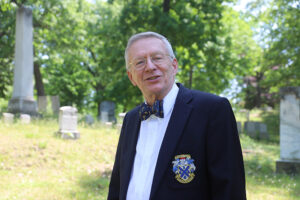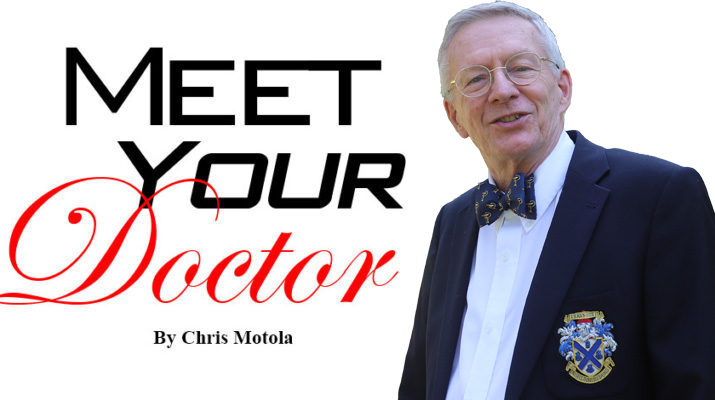Professor of clinical medicine at the URMC talks about the Edward Mott Moore Award he received and discusses his job of evaluating the credentials of foreign-born physicians
By Chris Motola
 Q: Congratulations on your Edward Mott Moore Award recently.
Q: Congratulations on your Edward Mott Moore Award recently.
A: Edward Mott Moore was a medical giant in Monroe County medical history. In the early- to mid-1830s he practiced advanced surgery and was ultimately the chair of four different surgery departments and medical schools around the country. He believed strongly in competency in the practice of medicine, and was one of the individuals who went to Philadelphia in 1847 and formed the American Medical Association. The Monroe County Medical Society, decades ago, established a recognition of physicians who they feel advanced medicine in our region. And they named this award the Edward Mott Moore Award. The award is done through individual nominations that are then considered by the awards committee. Then the individuals, if selected, are notified of something they didn’t even know was happening.
Q: How do you feel about that?
A: I was notified a few months ago that I was unanimously selected as the 2023 nominee, to be formally awarded at a masquerade ball in October. I don’t like attention called to myself. I think we have a community of individuals who have done things that have advanced medicine. It’s an unbelievable honor to be one of the few individuals identified to receive the Edward Mott Moore Award. They believed my contribution to setting the standards of competency, qualification and good moral character for our region were important enough that be recognized.
Q: One of your big duties is evaluating the credentials of foreign-born physicians. What are the issues that come with importing medical talent?
A: I’ll give you a little historical context. Back in the 1740s, investigative reporters started reporting on the widespread quackery of medical practitioners throughout New York and the settling territories. One of the results was a small group of physicians advocated for a medical practice act. So in 1760 New York passed the first effective medical practice act in the world, establishing what would be the criteria for education, background and experience needed to be a licensed practitioner. That original statute was so well-written that there weren’t any major revisions to it until after the Civil War. The New York State Medical Practice Act is pretty straightforward. It says you need to be qualified, competent and of good moral character. It’s fairly easy to apply. If you graduate from a New York college or university and go to a New York medical school, and get post-graduate training in New York, you qualify. Everyone else has to demonstrate that they’re that good.
Q: How does that apply to training in other states?
A: Over time, by a century ago, most states had their own individual medical licensing exam. Over time we developed accreditation of medical schools across the country. We’ve established universal licensing examinations. So the Board of Regents now says that if you go to an accredited medical school within the United States, that’s equivalent to going to a medical school in New York. Similarly if you take the US licensing examinations, we’ll accept those as qualified. And the Board of Regents requires that postgraduate education programs be accredited by the Accreditation Council for Graduate Medical Education or American Osteopathic Association. If you graduate from an ACGME or AOA residency program, that’s accepted as being equivalent to have gotten your postgraduate education in New York. If you don’t satisfy all of those, then the burden of proof is on you to prove that your education is as good as what you would have gotten in New York.
Q: And I assume that’s the big issue for foreign-trained physicians?
A: If you went to a medical school in France, England, Germany, Japan or Australia, that’s nice, but that’s not necessarily equivalent to going to medical school in New York. So the New York Board of Medicine works with the Board of Regents in establishing equivalency criteria. For instance, if you don’t have at least the equivalent of 60 semester hours of undergraduate education and at least 132 weeks of medical school, we’re not even going to look at you. If you do have that, then we’ll look at the content to see if that education is functionally equivalent to what you’d get in New York or not.
Q: What are the issues you see with overseas education and training?
A: In about half the countries in the world, medical schools aren’t accredited. You go to a university and, when they get tired of you, you get a degree with a specialty in medicine. In many of these countries the first degree the student gets after high school is a medical degree. It’s a baccalaureate degree. In England and in India, for instance, it’s a bachelor of medicine, bachelor of surgery. Because many of them do eventually want to come to the United States, many of those programs are at least five years. Some are six or seven. That helps them satisfy the minimum semester hours and weeks. In Ukraine, you go to college and your first degree can be your medical degree and you can become a specialist by doing an apprenticeship for just a few months. No licensing exams. No board certifications. You’re a doctor when you graduate. In some countries you graduate from college with a major in medical sciences. And once you do a year of military or government service, you have a lifetime medical license to practice. That isn’t like New York. So those individuals that want to practice here need to bring up their CV to look like what we’d expect from a medical student graduating from a residency in New York, and the expectation that you’ve taken past licensing exams and specialty exams.
Q: How do you go about the vetting process?
A: What I’ve done with New York state for more than two decades is ask “is this doctor’s resume essentially equivalent to New York?” And help the Regents establish criteria, as well as doing site visits to international schools that want to be recognized as equivalent to New York, most of which are in the Caribbean. So we’ll look at applicants and see if they have equivalent experience. Much of the time, the answer is yes. Not infrequently New York state will advise the applicant that they’re not yet quite qualified. In general, particularly for surgical disciplines, if you take the rest of the world, it takes about two years of postgraduate training to equal what is required in New York state in one year.
Q: Why is that?
A: We require certain experiences as part of accredited residency, varieties of patients, numbers of patients, hours on call, number of lectures. If you just take lectures, for example, most countries give fewer than half of the number of lectures US residents get per year. We expect with surgical training a certain amount of variety and volume. There is a country where you can do an ophthalmology residency never having done a single cataract operation and never even having seen once a retinal operation. If we licensed them in New York, would you want to be that doctor’s first ever cataract surgery?
Lifelines
Name: Roger M. Oskvig, M.D.
Position: Professor of clinical medicine at the University of Rochester Medical
Hometown: Williams, Iowa
Education: University of Iowa College of Medicine
Affiliations: Strong Memorial, Highland, Nicholas Noyes, Jones Memorial hospitals
Organizations: Monroe County Medical Society, Medical Society of the State of New York, American College of Physicians
Family: Wife, three sons, seven grandchildren
Hobbies: Fly fishing, woodworking

